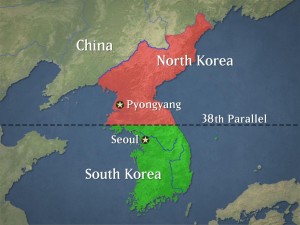Asia Sunday theme focuses on ‘Korea: Towards Unity in the Bond of Peace’

The Christian Conference of Asia (CCA) chose the theme for Asia Sunday 2016 on ‘Korea: Towards Unity in the Bond of Peace’ based on the Biblical verse, Ephesians 4:3: “Make every effort to keep the unity of the Spirit through the bond of peace”.
Asia Sunday is observed every year on the Sunday before Pentecost, and in 2016, Asia Sunday falls on 8th May.
In a message addressed to CCA member churches and councils in Asia, as well as churches and ecumenical partners around the world, CCA General Secretary Dr. Mathews George Chunakara stated, “events of recent months have shown once again how sharp the conflict and the political standoff in which North and South Koreas have been entangled in continuous tension. The present situation in the Korean peninsula warrants a renewed engagement to work for peace, reconciliation and reunification of the divided Korean peninsula.”
He added that, “The call for peace in the Korean peninsula is pressing now more than ever before. Peace-making in Korea could be a sign of hope, a symbol of healing and reconciliation. As we pray with and for the peoples of the Korean peninsula, churches and ecumenical partners have a specific responsibility towards intensifying our efforts collectively to build peace and reconciliation in the region.”
“The observance of the Asia Sunday-2016 on the theme ‘Korea: Towards Unity in the Bond of Peace’ is yet another initiative of CCA on behalf of the ecumenical movement to prepare the churches and various actors in the ecumenical movement around the world to renew their commitment to peace, reconciliation and reunification of the Korean peninsula”, said the CCA General Secretary.
Asia Sunday is observed every year on the Sunday before Pentecost, which coincides with the founding of CCA in 1957. Asia Sunday celebrations focus on a particular theme, and calls upon member churches and councils, as well as churches and ecumenical partners around the world, to organise special prayers and worship services to observe Asia Sunday.
“ In 2016, Asia Sunday falls on 8th May, but as usual churches and councils are free to choose a date to observe the Asia Sunday at the local or national contexts, according to their convenience”; said Rev. Jung Eun Moon, program coordinator in charge of Asia Sunday-2016.
The divided Korea is one of the last remnants of Cold War politics. Millions of people were killed during the Korean War. Over ten million people were separated from their immediate family members.
Animosity between the two countries has been on the rise in recent weeks. The recent launching of rockets and hydrogen bomb testing has put the relationship between the two Koreas to the test once again. South Korea and the U.S are now planning to deploy the Terminal High Altitude Area Defense (THAAD) missile defense system on South Korean soil. The U.N. Security Council on 2 March 2016 approved the toughest sanctions on North Korea in two decades, reflecting growing anger at Pyongyang's defiance on the ban on all nuclear-related activity.
The Liturgy of Asia Sunday can be found here: Asia Sunday 2016










